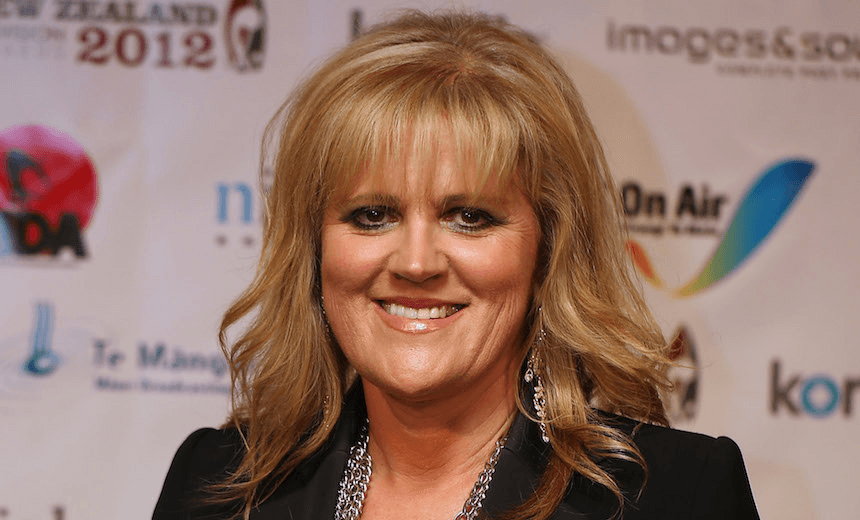When Julie Christie was announced as recipient of one of our most prestigious honours on Queen’s Birthday, many were shocked and appalled. Duncan Greive, one-time recipient of a defamation letter from Christie, makes the case for her as a worthy Dame.
“I pretty much decided that I was going to become a major commercial success so I didn’t have to be a critical success,” Julie Christie told Diana Wichtel in a deft 2006 Listener profile. It’s a more elegant summation of Christie’s career than anything I could come up with, and precisely the reason I think she’s entirely justified in being named Dame Companion of the New Zealand Order of Merit.
That distinction – how to weigh the commercially and critically successful – is one New Zealand has struggled with for years. This is, perhaps, because commercial TV broadcasting came very late to this country. In the US and Australia it was commercial from day one, while even the UK had independent competition for the BBC from the mid-fifties. Here though, with our statist central control and fetishisation of a very specific era of Britain, we waited until the waning months of the ‘80s before allowing competition for TVNZ.
(Incidentally, knighthoods are another queasy colonial throwback we should have left in the past. But if you’re going to have them, giving them to divisive reality TV producers from Greymouth is an excellent way to subvert their classist foundations).
As a result of this television monopoly we didn’t really know what audiences wanted until relatively recently – only what commissioners thought would be good for them. When we found out what it was, the cultured class winced: instead of quality drama and long-form current affairs, we watched goonish reality TV and stunt-riddled game shows.
A Julie Christie would have struggled mightily in the NZBC era; in that which came later, she thrived. By comparison to other production companies, the one she built, Touchdown, had almost no relationship with NZ on Air. Say what you want about Ready Steady Cook, Marc and Matthew, The Chair and all that – New Zealanders loved them, and, better yet, never had to shell out a cent to pay for them.
Christie was a masterful judge of what regular people would find entertaining. Not necessarily nourishing – but then, that has always been in the eye of the beholder. Instead her vision of television was bright colours and big personalities who could be moved from one wild idea to the next as soon as interest started to fade. To her TV was a medium which existed to allow the mind to relax at the end of day’s work, not a realm for the intellectual or political.
That this conception of television has somewhat swung around in the decade since, during the ‘golden age’ and streaming eras, doesn’t mean that her model was flawed, just that it worked particularly well for a specific period. Some of the more furious criticism of her Queen’s Birthday honour had this elitist vision of culture as its subtext; while others came from what has happened at MediaWorks since her arrival on its board.
That era is rightly less celebrated. Along with some good, occasionally great reality TV, we also saw the dismantling of one of the great private newsrooms in the country. Yet its stars have found new and arguably better homes, The Project is fresh and building and Newshub just won best news site at the Canons. As much as there was a sadness to what happened, it was hardly the end of journalism – it just felt that way at the time.
Besides, Christie was placed on the board precisely to advocate for that approach. It was the executive’s role to hear that advocacy and appropriately weigh it. If you feel they went too far, save your fury for Mark Weldon.
Christie in her prime seems like a force of nature: very driven; quite frightening. She had her first child induced, then returned to work the following day. She allegedly kept a sex tape of Charlotte Dawson recorded during one show and would casually mention her kindness in keeping it off air for years afterwards. If Saunders’ insinuations in that linked column are correct then she’s someone you’d think twice about working anywhere near. Similarly, during a period when I was reporting on MediaWorks’ lurch from crisis to crisis I had a number of people call with stories of her ruthlessness.
Some of this is pretty bad, but has to be measured against what she did accomplish, as a woman and almost entirely off her own steam. She sold her business for $40m and had her formats air around the world. She created a generation of dorky stars and dominated ratings – if not critical respect – for a clear decade. Broadcasting has never seen anything like her.
If this reads less like a defence than an obituary, it is perhaps understandable. Her influence isn’t what it once was. But as someone who runs a site which appreciates both the high and the low of television, I wish we had more programming like The Player, her bizarre dating show, or our corny, heartfelt This is Your Life. New Zealand’s channels are now much more likely to be filled with compentently-made overseas shows, and feel less like a reflection of who we are as a result. For better or worse, when Christie was in her prime, there were a lot more New Zealanders on screen – and more again watching them.
